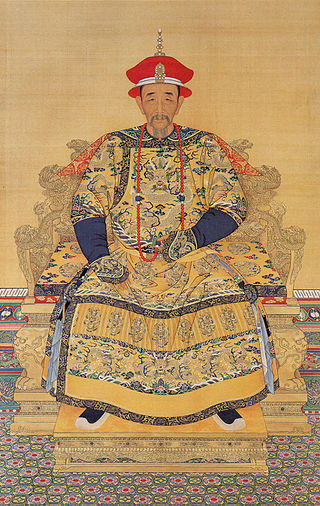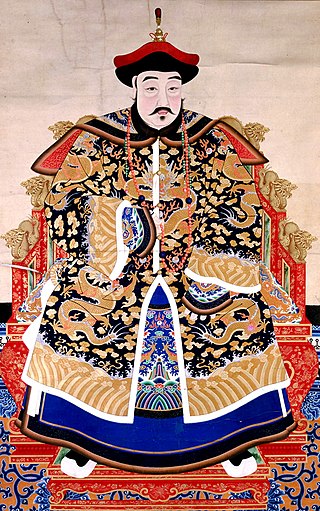
The Kangxi Emperor,also known by his temple name Emperor Shengzu of Qing,personal name Xuanye,was the third emperor of the Qing dynasty,and the second Qing emperor to rule over China proper. His reign of 61 years makes him the longest-reigning emperor in Chinese history and one of the longest-reigning rulers in history. He is considered one of China's greatest emperors.

Oboi was a prominent Manchu military commander and courtier who served in various military and administrative posts under three successive emperors of the early Qing dynasty. Born to the Guwalgiya clan,Oboi was one of four regents nominated by the Shunzhi Emperor to oversee the government during the minority of the Kangxi Emperor. Oboi reversed the benevolent policies of the Shunzhi Emperor,and vigorously pushed for clear reassertion of Manchu power over the Han Chinese. Eventually deposed and imprisoned by the new emperor for having amassed too much power,he was posthumously rehabilitated.

Dodo,formally known as Prince Yu,was a Manchu prince and military general of the early Qing dynasty.
Hešeri,is a clan of Manchu nobility with Jianzhou Jurchens roots,originally hailing from the area which is now the modern Chinese provinces of Jilin and Liaoning. It was once one of the most important and powerful noble families in the early Qing dynasty in China,second only to the royal House of Aisin Gioro,to whom they were closely related by marriage.

Ebilun was a Manchu noble and warrior of the Niohuru clan,most famous for being one of the Four Regents assisting the young Kangxi Emperor from 1661 to 1667,during the early Qing dynasty (1644–1912). A largely passive figure during the regency,Ebilun was disgraced following the ouster of the far more powerful regent Oboi and considered a political supporter of the latter. He was stripped of his positions by the emperor but later regained his noble rank. Many of his descendants became influential figures in the Qing imperial government.

Yinxiang,formally known as Prince Yi,was a Manchu prince of the Qing dynasty. The thirteenth son of the Kangxi Emperor,Yinxiang was a major ally of his brother Yinzhen during the latter's struggle for the succession of the throne. He was made a qinwang during Yongzheng's reign and became one of his closest advisors. He died eight years into the reign of the Yongzheng Emperor and was memorialized with top honours by the emperor. When he died,his title was granted "iron-cap" status and became perpetually inheritable,one of the only twelve such princes in Qing dynasty history.
Mingju,of the Manchu Nara clan,was an official of the Qing Dynasty during the reign of the Kangxi Emperor. He was thrown in prison for corruption.
Tunggiya is the name of a Manchu clan.
Longkodo was a Manchu court official who lived in the Qing dynasty. He was from the Tunggiya clan,which was under the Bordered Yellow Banner. His period of fame lasted from the late Kangxi era to the early Yongzheng era,perhaps most famous for delivering the Kangxi Emperor's disputed will.

Empress Xiaokangzhang,of the Manchu Bordered Yellow Banner Tunggiya clan,was the concubine of the Shunzhi Emperor and mother of the Kangxi Emperor during the Qing dynasty. She was honoured as Empress Dowager Cihe during the reign of her son and was posthumously honoured as empress,although she never held the rank during her lifetime.

Empress Xiaoyiren,of the Manchu Bordered Yellow Banner Tunggiya clan,was a posthumous name bestowed to the wife and third empress consort of Xuanye,the Kangxi Emperor. She was empress consort of Qing in 1689.
Jirgalang or Jirhalang was a Manchu noble,regent,and political and military leader of the early Qing dynasty. Born in the Aisin Gioro clan,he was the sixth son of Šurhaci,a younger brother of Nurhaci,the founder of the Qing dynasty. From 1638 to 1643,he took part in many military campaigns that helped destroy the Ming dynasty. After the death of Huangtaiji in September 1643,Jirgalang became one of the young Shunzhi Emperor's two co-regents,but he soon yielded most political power to co-regent Dorgon in October 1644. Dorgon eventually purged him of his regent title in 1647. After Dorgon died in 1650,Jirgalang led an effort to clean the government of Dorgon's supporters. Jirgalang was one of ten "princes of the first rank" (和碩親王) whose descendants were made "iron-cap" princes (鐵帽子王),who had the right to transmit their princely titles to their direct male descendants perpetually.

Nurhaci,also known by his temple name as the Emperor Taizu of Qing,was the founding khan of the Jurchen-led Later Jin dynasty.
Maci (1652–1739) was a Manchu Bordered Yellow Banner court official who lived in the Qing dynasty. He was from the Fuca clan,and was the eldest son of Mishan (米思翰).

Dowager Imperial Noble Consort Quehui,of the Manchu Bordered Yellow Banner Tunggiya clan,was a consort of the Kangxi Emperor. She was 14 years his junior.
Lolohun was Qing dynasty imperial prince as the first son of Yoto,Daišan's grandson and Nurhaci's great grandson. Lolohun was the second holder of the Prince Keqin of the Second Rank peerage and the sole holder of prince Yanxi of the Second Rank title. After his death,the peerage was renamed to Prince Ping of the Second Rank.
Yunki,born Yinqi and formally known as Prince Heng of the First Rank,was an imperial prince of the Manchu ruled Qing dynasty. He was the fifth son of the Kangxi Emperor who survived to adulthood.
Tong Guowei was a Qing dynasty official. He was a maternal uncle of Kangxi Emperor.








